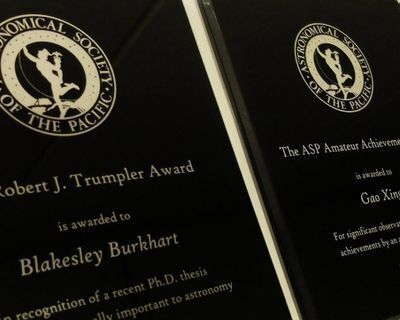Maria and Eric Muhlmann Award
For important research results based upon development of groundbreaking instruments and techniques
The Maria and Eric Muhlmann Award is given for recent significant observational results made possible by innovative advances in astronomical instrumentation, software, or observational infrastructure.
-
The Maria and Eric Muhlmann Award will be given in 2026
Please contact the Awards team if you have questions about the nomination process.

Dr. Robert Simcoe, Director of the MIT Kavli Institute for Astrophysics and Space Research, to receive the 2024 Muhlmann Award.
SAN FRANCISCO, California – September 16, 2024 The Maria and Eric Muhlmann Award is given for recent significant observational results made possible by innovative advances in astronomical instrumentation, software, or observational infrastructure. The 2024 recipient of the Muhlmann Award is Dr. Robert Simcoe for his leadership in building Folded-port InfraRed Echellette (FIRE) that has contributed to transformational discoveries in multiple subdisciplines.
Simcoe is the Francis L. Friedman Professor of Physics at MIT, where he leads the Astronomical Instrumentation Team, and is currently the Director of the MIT Kavli Institute for Astrophysics and Space Research. As a researcher, Simcoe has a portfolio of results on the evolution of the early Universe, but the Muhlmann recognition is for the design, construction, and operations of the Folded-port InfraRed Echellette (FIRE) installed on the 6.5-meter Magellan-Baade Telescope at Las Campanas Observatory, located in Chile’s Atacama Desert. FIRE is a unique instrument optimized for infrared spectroscopy of faint targets that include the very high redshift universe, low mass stars, and solar system objects, among others. FIRE’s technical design – in particular its compact and efficient optical package that permits it to be “always available” on the telescope – has enabled discoveries in several high-interest fields in astrophysics.
Unique amongst instruments in its class, FIRE allows observations in two key modes: one at spectral resolution allowing quick and effective classification of faint candidate objects of interest and another at high spectral resolution, allowing detailed follow-up and characterization of rare, diamond-in-the-rough targets. FIRE has been used to classify candidates for room-temperatures stars. Known as Y-class brown dwarfs, these ultra-low mass stars provide insight into the physics that separate the smallest and coolest stars from the largest planets. FIRE has also been used to identify the most distant known supermassive black holes analogous to black holes identified UV and optical wavelengths in the nearby universe, but whose signatures are shifted by cosmic expansion into the infrared. At early times in the Universe, these black holes are thought to be critical components of the formation and evolution of early galaxies.
Simcoe’s leadership on FIRE led to its development, construction, and commissioning in under three years. It was funded through one of the largest astrophysics’ instrumentation awards in its program class from the National Science Foundation at the time. Simcoe’s leadership continued through active and engaged participation in the research of his user community, with his collaborators commenting on the importance of his insights in their ground-breaking work. Simcoe has also mentored numerous early career researchers who have been honored with the most competitive research fellowships and are now recognized leaders in their respective sub-disciplines.
Simcoe’s collective instrumentation development programs have received over $10 million in funding from the National Science Foundation, including his current project, the Large Lenslet Array Magellan Spectrograph (LLAMAS). Lastly, Simcoe has served on numerous observatory science advisory committees and is active in reviewing and advising other major instrumentation projects at Las Campanas Observatory, all of which pay forward to the next generation of instrumentalists and researchers.
Join us in celebration of Robert Simcoe’s achievements at the in-person ASP Awards Gala on Saturday, November 9, 2024 in Burlingame, CA

